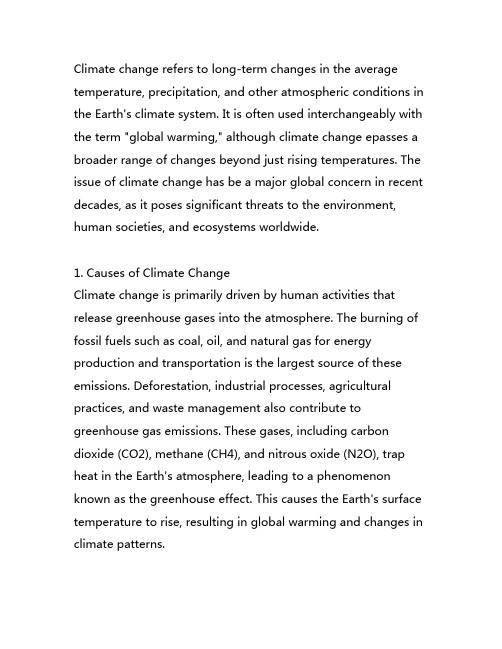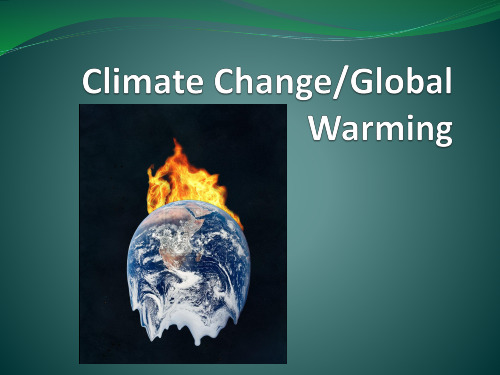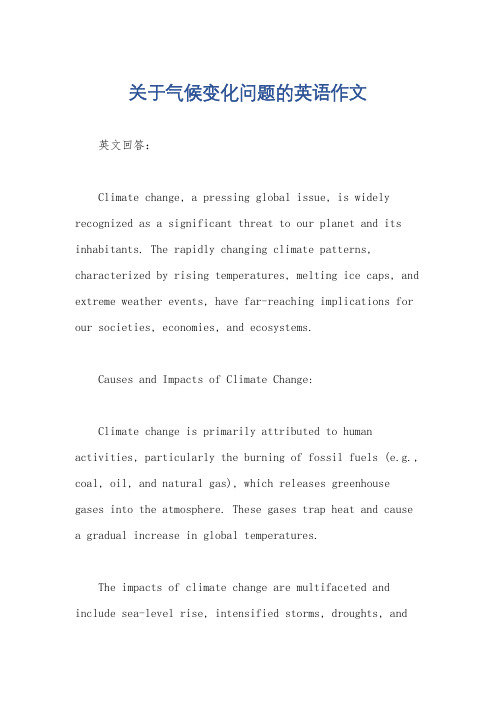climate change
气候变化的英语作文

气候变化的英语作文英文回答:Climate change is a pressing issue that affects us all. The Earth's climate is changing at a rapid pace, and it's largely due to human activities such as burning fossil fuels, deforestation, and industrial processes. These activities release greenhouse gases into the atmosphere, which trap heat and cause the planet to warm up.One of the most obvious impacts of climate change is the increase in extreme weather events. For example, in recent years, we have seen an increase in the frequency and intensity of hurricanes, heatwaves, and droughts. These extreme weather events not only pose a threat to humanlives and infrastructure but also have a significant impact on the environment and wildlife.Another consequence of climate change is the melting of polar ice caps and glaciers. This has led to rising sealevels, which is a major concern for coastal communities around the world. In fact, some small island nations are at risk of being completely submerged if sea levels continue to rise at the current rate.Furthermore, climate change also affects agriculture and food security. Changes in temperature and precipitation patterns can lead to crop failures and food shortages, which can have devastating effects on communities that rely on agriculture for their livelihoods.In addition to these direct impacts, climate change also has far-reaching implications for public health, as it can exacerbate air and water pollution, spread vector-borne diseases, and increase the risk of heat-related illnesses.中文回答:气候变化是一个紧迫的问题,影响着我们所有人。
我们可以做些什么来应对气候变化英语作文

我们可以做些什么来应对气候变化英语作文Climate change is a global challenge that requires collective action from individuals, communities, and governments. There are several actions that can be taken to address climate change:1. Reduce carbon emissions: One of the most effective ways to combat climate change is to reduce carbon emissions. This can be achieved by transitioning to renewable energy sources, improving energy efficiency, and promoting sustainable transportation options.2. Protect and restore ecosystems: Ecosystems such as forests, wetlands, and oceans play a crucial role in regulating the Earth's climate. Protecting and restoring these ecosystems can help mitigate the impacts of climate change.3. Promote sustainable agriculture and land use: Agriculture and land use are major contributors to greenhouse gas emissions. By promoting sustainable farmingpractices, reforestation, and land conservation, we can reduce the impact of agriculture on the climate.4. Adapt to the impacts of climate change: Climate change is already causing significant impacts on communities and ecosystems. It is important to adapt to these changes by implementing measures such as building resilient infrastructure, improving water management, and enhancing disaster preparedness.5. Support policies and initiatives: Individuals can support policies and initiatives that aim to address climate change, such as carbon pricing, renewable energy incentives, and international climate agreements.6. Raise awareness and educate others: Educating others about the impacts of climate change and the actions that can be taken to address it is crucial. By raising awareness and promoting sustainable behaviors, we can create aculture of climate action.以上就是应对气候变化的一些方法,我们每个人都可以为保护地球环境出一份力,让我们一起行动吧!。
Climate change

【导读】:近些年,随着气候变暖,极端天气的发生越加频繁。
美国戈达德太空研究所的负责人汉森博士被尊为“气候变暖研究之父”,他与他的同事将一起揭晓六十年来气候变暖到底有多严重。
Climate change气候变化Bell weather呈“钟形曲线”变化的天气A statistical analysis shows how things really are heating up一项统计分析显示出天气究竟是如何变热的Aug 11th 2012 | from the print editionARE heatwaves more common than they used to be? That is the question addressed by James Hansen and his colleagues in a paper just published in the Proceedings of the National Academy of Sciences. Their conclusion is that they are—and the data they draw on do not even include the current scorcher that is drying up much of North America and threatening its harvest. The team’s method of presentation, however, has caused a stir among those who feel that scientific papers should be dispassionate in their delivery of the evidence. For the paper, interesting though the evidence it delivers is, is far fromdispassionate.热浪来袭真的比以前更加频繁了吗?詹姆斯•汉森①与他的同事试图在《美国国家科学院院报》上发表的一篇新文章中回答这一问题。
climate change 英文释义

Climate change refers to long-term changes in the average temperature, precipitation, and other atmospheric conditions in the Earth's climate system. It is often used interchangeably with the term "global warming," although climate change epasses a broader range of changes beyond just rising temperatures. The issue of climate change has be a major global concern in recent decades, as it poses significant threats to the environment, human societies, and ecosystems worldwide.1. Causes of Climate ChangeClimate change is primarily driven by human activities that release greenhouse gases into the atmosphere. The burning of fossil fuels such as coal, oil, and natural gas for energy production and transportation is the largest source of these emissions. Deforestation, industrial processes, agricultural practices, and waste management also contribute to greenhouse gas emissions. These gases, including carbon dioxide (CO2), methane (CH4), and nitrous oxide (N2O), trap heat in the Earth's atmosphere, leading to a phenomenon known as the greenhouse effect. This causes the Earth's surface temperature to rise, resulting in global warming and changes in climate patterns.2. Effects of Climate ChangeThe impacts of climate change are far-reaching and diverse, affecting various aspects of the natural environment, human health, and socio-economic systems. Rising temperatures can lead to more frequent and severe heatwaves, droughts, and wildfires, as well as melting polar ice caps and rising sea levels. Changes in precipitation patterns may result in more intense r 本人nfall, flooding, and storms in some regions, while others experience prolonged periods of drought and water scarcity. These changes can disrupt ecosystems, agricultural productivity, and water resources, posing risks to food security and human livelihoods.3. Climate change also poses significant health risks, as it can increase the spread of vector-borne diseases, such as malaria and dengue fever, and exacerbate 本人r pollution and respiratory illnesses. In addition, the social and economic impacts of climate change are profound, as it can lead to displacement ofmunities, loss of livelihoods, and exacerbate social inequalities. Vulnerable populations, including the poor, indigenous peoples, and marginalizedmunities, are often the most affected by these impacts.4. Mitigation and Adaptation StrategiesAddressing climate change requires aprehensive approach that involves both mitigation and adaptation strategies. Mitigation involves reducing greenhouse gas emissions by transitioning to renewable energy sources, improving energy efficiency, and implementing policies to limit emissions from various sectors. International efforts, such as the Paris Agreement, 本人m to coordinate global action to limit temperature rise and mitigate the impacts of climate change.5. Adaptation strategies focus on building resilience to the impacts of climate change, such as investing in infrastructure to withstand extreme weather events, implementing water conservation measures, and developing early warning systems for natural disasters. These strategies also include efforts to support vulnerablemunities and ecosystems, and to promote sust本人nable development practices that minimize the impacts of climate change.6. Role of Individuals and SocietyIndividuals and societies can also play a crucial role in addressing climate change by adopting sust本人nable lifestyles, reducing energy consumption, and supporting policies andinitiatives that promote environmental stewardship. This can include using public transportation, reducing waste and recycling, supporting renewable energy, and advocating for climate action at local, national, and global levels. Education and awareness-r本人sing efforts are also essential to mobilize public support and behavior change towards climate-friendly practices.7. ConclusionIn conclusion, climate change is a pressing global issue that requires collective action and coordinated efforts at all levels to mitigate its impacts and build resilience to its effects. By understanding the causes and consequences of climate change, and implementing strategies to reduce greenhouse gas emissions and adapt to its impacts, it is possible to address this challenge and work towards a more sust本人nable and resilient future for our planet and future generations.。
世界气候变化Climate Change(温室效应Green House Effect)英文介绍

into space; the rest is absorbed by Earth’s system 3. Because of greenhouse gases in the atmosphere, only some of the sun’s energy is allowed to escape immediately—instead, the gases stay within the atmosphere, bouncing in all directions 4. The atmosphere is heated up as less and less gases are let out into space and more energy is absorbed by Earth
CO2 emissions Every ton of coal actually releases 2.86 tons of CO2—how is this possible?
Because coal is compressed carbon—when the carbon gets released,
Definitions according to
Global Warming process
1. The sun emits energy towards the Earth 2. The Earth reflects around 30% of the energy back
Process
Causes
What human-related causes are there? Deforestation Agriculture Fossil fuel burning Aerosol gases
《The Consequences of Climate Change》高考优秀英语作文

《The Consequences of Climate Change》高考优秀英语作文The Consequences of Climate ChangeClimate change is one of the most pressing issues facing our planet today. Not only is it a global issue, but it affects every living creature on Earth, and its impact is becoming increasingly serious.The consequences of climate change are far-reaching and can be seen through physical, economic and social changes. Examples of physical changes include rising sea levels, land degradation, more frequent and intense droughts, floods, hurricanes and other extreme weather events. These extreme events have caused severe damage to natural ecosystems, resulting in declines in wildlife populations and reduced availability of fresh water for humans.The economic consequences of climate change include higher costs for food production and distribution, increased energy prices, and the loss of coastal property and tourism. Higher temperatures also mean a decrease in manufacturing productivity, thus leading to a further negative effect on economies.The social implications of climate change have caused displacement of people from their homelands due to extreme weather events, as well as food insecurity and poverty. Other associated risks include health impacts as a result of air pollution and water-related diseases, and mental health issues such as stress and anxiety.Given these facts, it is clear that climate change is an urgent issue that must be addressed. We must take action both locally andglobally to reduce greenhouse gas emissions and promote sustainable development. By doing so, we can help to protect our planet for future generations.。
关于气候变化问题的英语作文

关于气候变化问题的英语作文英文回答:Climate change, a pressing global issue, is widely recognized as a significant threat to our planet and its inhabitants. The rapidly changing climate patterns, characterized by rising temperatures, melting ice caps, and extreme weather events, have far-reaching implications for our societies, economies, and ecosystems.Causes and Impacts of Climate Change:Climate change is primarily attributed to human activities, particularly the burning of fossil fuels (e.g., coal, oil, and natural gas), which releases greenhouse gases into the atmosphere. These gases trap heat and cause a gradual increase in global temperatures.The impacts of climate change are multifaceted and include sea-level rise, intensified storms, droughts, andheat waves. These events can lead to widespread damage to infrastructure, displacement of populations, disruption of ecosystems, and loss of biodiversity.Scientific Consensus and Urgency:An overwhelming scientific consensus exists that climate change is real, human-induced, and poses a grave danger to the planet. Observations from various scientific disciplines, including atmospheric chemistry, climatology, and oceanography, provide ample evidence of the changing climate. The Intergovernmental Panel on Climate Change (IPCC), an international body of scientists, has consistently affirmed the urgency of addressing climate change.Consequences for Future Generations:Failure to mitigate climate change will have severe consequences for future generations. Rising sea levels could submerge coastal cities and displace millions of people. Extreme weather events will become more frequentand destructive, threatening lives, livelihoods, and food security. Moreover, climate change impacts ecosystems, affecting biodiversity, food chains, and the availabilityof natural resources.Mitigation and Adaptation:Addressing climate change requires a collective effortto reduce greenhouse gas emissions and adapt to its impacts. Mitigation strategies include transitioning to renewable energy sources, promoting energy efficiency, and adopting sustainable land-use practices. Adaptation measures, suchas building seawalls and relocating communities, are necessary to protect populations and infrastructure fromthe effects of climate change.Responsibility and Cooperation:Responsibility for addressing climate change is shared by all nations. Wealthier countries have a historical responsibility for greenhouse gas emissions and should provide financial and technical assistance to developingcountries in their efforts to mitigate and adapt to climate change. International cooperation and collaboration are crucial for implementing effective climate action.中文回答:气候变化问题。
climate change 英语作文

climate change 英语作文Climate change is a significant and pressing issue that is affecting our planet. The rise in global temperatures, extreme weather events, melting ice caps, and rising sea levels are all evidence of the impact of climate change. This issue not only poses a threat to the natural environment but also has far-reaching implications for human societies and economies.One of the key drivers of climate change is the increasing concentration of greenhouse gases in the atmosphere, primarily due to human activities such as the burning of fossil fuels, deforestation, and industrial processes. These actions have led to the enhanced greenhouse effect, trapping heat within the Earth's atmosphere and causing temperatures to rise.The consequences of climate change are already being felt around the world. From more frequent and severe heatwaves to devastating hurricanes and flooding, the impact of climate change is undeniable. In addition, the melting of polar ice caps and glaciers is contributing torising sea levels, posing a threat to coastal communities and ecosystems.In response to these challenges, global efforts to address climate change have been ramping up. The Paris Agreement, signed by nearly 200 countries, aims to limit the global temperature increase to well below 2 degrees Celsius above pre-industrial levels and to pursue efforts to limit the temperature increase to 1.5 degrees Celsius. This agreement represents a significant step forward in international cooperation to combat climate change.However, despite these efforts, more needs to be done to mitigate and adapt to the impacts of climate change. It is essential for countries to transition to low-carbon and sustainable energy sources, invest in renewable energy technologies, and implement policies to reduce greenhouse gas emissions. Additionally, protecting and restoring natural ecosystems, such as forests and wetlands, can play a crucial role in sequestering carbon and mitigating the effects of climate change.Individual actions are also important in addressing climate change. Making simple changes in our daily lives,such as reducing energy consumption, using public transportation, and minimizing waste, can collectively make a significant impact in reducing greenhouse gas emissions.In conclusion, climate change is a complex and urgent issue that requires collective action at the global, national, and individual levels. By working together to reduce greenhouse gas emissions, transition to sustainable energy sources, and protect natural ecosystems, we can mitigate the impacts of climate change and build a more sustainable future for the planet.气候变化是一个重大而迫切的问题,正在影响着我们的星球。
- 1、下载文档前请自行甄别文档内容的完整性,平台不提供额外的编辑、内容补充、找答案等附加服务。
- 2、"仅部分预览"的文档,不可在线预览部分如存在完整性等问题,可反馈申请退款(可完整预览的文档不适用该条件!)。
- 3、如文档侵犯您的权益,请联系客服反馈,我们会尽快为您处理(人工客服工作时间:9:00-18:30)。
1/16/2016
1/16/2016
• In recent years, scientists have noticed that earth’s average temperature has been rising. The phenomenon is referred to as global warming. Global warming is created by complex changes in the atmosphere, which are caused by increases in greenhouse gases. Greenhouse gases are special gases in the atmosphere, which have kept the earth’s temperature constant for the past 5000 years.
1/16/2016
• The effects of climate change also are happening to the world’s rain. A lot of areas often happened long droughts, big floods, strong winds and storms. Many people were killed and lost their family. The extreme weather is happening more often than before because of climate change.
• So how should we do to change these? • These are my Suggestions: • We can't do something is a very big, but we can do what we can . • For example, we can walk or ride a bike to school, the use of clean energy, try not to use disposable chopsticks, and so on. • I believe that as long as every one of us to change a bit, the world will be a great change.
Climate Change
• Weather surrounds us all the time. We need to choose which clothes I need to wear depend on the weather. Earth’s mild climate even ensures that we can grow food and enjoy a happy life. In a word, weather influence6
• •The common greenhouse gases are carbon dioxide. Carbon dioxide occurs naturally in the atmosphere, but humans also generate them. More and more greenhouse gases become part of the atmosphere, more heat is trapped and the earth’s overall temperature rises.
• Climate change means a big change in the world’s climate and describes the process by which the overcall climate moves from one average to a new average. The climate has changed a lot. 20,000 years ago was the last Ice Age. Nowadays, the climate of earth is changing because of us.
